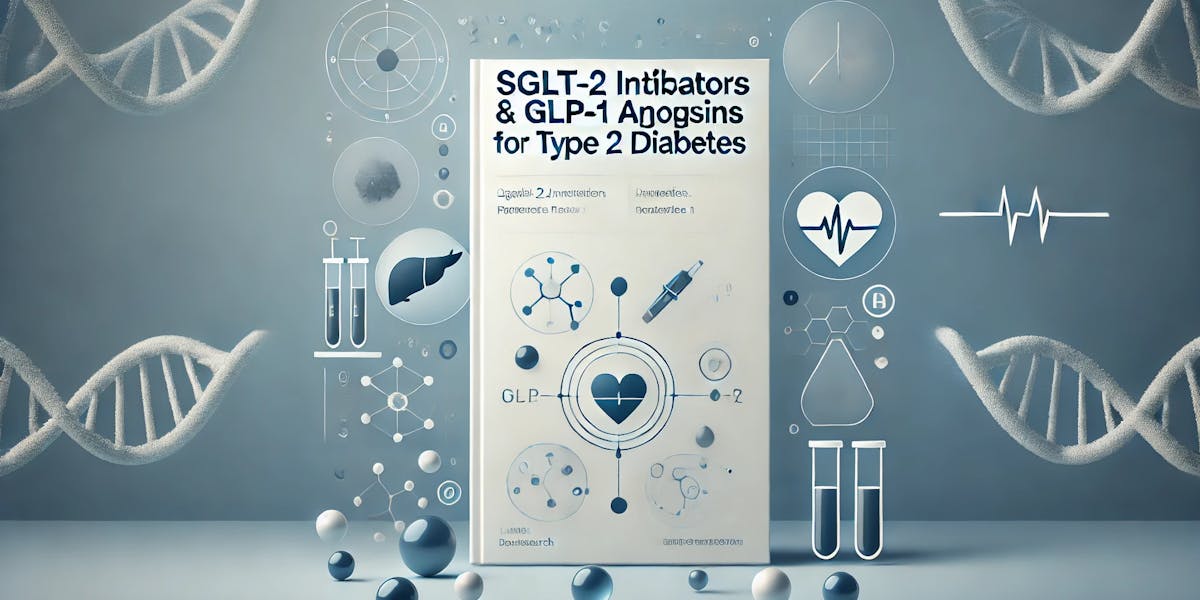SGLT-2 Inhibitors & GLP-1 Agonists for T2D
The BMJ (British Medical Journal)

Summary
This systematic review and network meta-analysis assessed the efficacy and safety of SGLT-2 inhibitors and GLP-1 receptor agonists in patients with Type 2 Diabetes. Both drug classes showed reductions in all-cause mortality, cardiovascular mortality, non-fatal myocardial infarction, and kidney failure, with some differences in secondary outcomes.
Study Design
Interventions
Study Type
Outcomes
Duration and Size
Study Population
Age Range
Sex
Geography
Other Criteria
Methodology
The study conducted a systematic review and network meta-analysis of randomized controlled trials assessing SGLT-2 inhibitors and GLP-1 receptor agonists in adults with Type 2 Diabetes. It included 764 trials with 421,346 patients and evaluated the effects of these drugs on mortality, cardiovascular events, kidney outcomes, and adverse effects. The review used GRADE certainty assessment and provided absolute effect estimates.
Interventions
Patients were treated with SGLT-2 inhibitors or GLP-1 receptor agonists in addition to their standard diabetes management. The study compared these interventions against placebo or standard care to evaluate their effects on cardiovascular and renal outcomes.
Key Findings
Both SGLT-2 inhibitors and GLP-1 receptor agonists significantly reduced cardiovascular mortality, non-fatal myocardial infarction, and kidney failure. SGLT-2 inhibitors were more effective in reducing hospital admissions for heart failure, while GLP-1 receptor agonists showed stronger effects in lowering non-fatal stroke risk. Genital infections were more frequent with SGLT-2 inhibitors, while GLP-1 receptor agonists had an increased risk of severe gastrointestinal events.
Comparison with other Studies
Several studies have compared the efficacy of SGLT-2 inhibitors and GLP-1 receptor agonists in Type 2 Diabetes (T2D) management, particularly in reducing cardiovascular and renal complications. The BMJ study by Zaccardi et al. (2020) conducted a network meta-analysis, showing that both drug classes lower cardiovascular and kidney disease risks, with SGLT-2 inhibitors excelling in heart failure prevention and GLP-1 receptor agonists showing stronger effects on stroke reduction. Similar findings were reported in a meta-analysis by Zelniker et al. (2019) in Circulation, which highlighted that SGLT-2 inhibitors primarily benefit heart failure and renal outcomes, whereas GLP-1 receptor agonists reduce major atherosclerotic cardiovascular events (MACE). Another systematic review by Palmer et al. (2021) in The Lancet Diabetes & Endocrinology reinforced these results, noting that combination therapy could provide complementary benefits. Meanwhile, a 2022 Cochrane review confirmed the safety profile of both drug classes but highlighted gastrointestinal side effects with GLP-1 receptor agonists and genital infections with SGLT-2 inhibitors. Overall, the consensus from these studies supports individualized treatment decisions based on patient profiles, with SGLT-2 inhibitors preferred for heart failure or kidney disease patients, and GLP-1 receptor agonists for those at high stroke or atherosclerotic risk.
Journal Reference
Zaccardi F, Khan H, Schmidt AF, et al. Sodium-glucose cotransporter protein-2 (SGLT-2) inhibitors and glucagon-like peptide-1 receptor agonists for treatment of type 2 diabetes: a systematic review and network meta-analysis of randomised controlled trials. BMJ. 2020;372:m4573. doi:10.1136/bmj.m4573.
Related and Discussions
Benefits of SGLT2 Inhibitors and GLP-1 Receptor Agonists
Impacts of GLP-1 Receptor Agonists and SGLT-2 Inhibitors on Chronic Kidney Disease Care
SGLT2 Inhibitors vs GLP-1 Agonists: A Cardiologist and Endocrinologist Perspective
Combining Glucagon-Like Peptide 1 Receptor Agonists and Sodium-Glucose Cotransporter 2 Inhibitors in Patients With Type 2 Diabetes: A Therapeutic Advantage?
SGLT2 Inhibitors vs. GLP-1 Agonists to Treat the Heart, the Kidneys, or Both?
SGLT2 Inhibitors or GLP-1 Receptor Agonists as Second-Line Therapy for Type 2 Diabetes: A Systematic Review and Meta-Analysis
GLP-1 Receptor Agonist Therapy With and Without SGLT2 Inhibitors in Patients With Type 2 Diabetes and Cardiovascular Disease: A Meta-Analysis of Cardiovascular Outcomes
Sodium-glucose cotransporter protein-2 (SGLT-2) inhibitors and glucagon-like peptide-1 receptor agonists for treatment of type 2 diabetes: a systematic review and network meta-analysis of randomised controlled trials
Efficacy and safety of GLP-1 receptor agonists versus SGLT-2 inhibitors as add-on to metformin in patients with type 2 diabetes mellitus: a systematic review and meta-analysis
Cardiovascular, Kidney, and Safety Outcomes With GLP-1 Receptor Agonists in Type 2 Diabetes: A Meta-Analysis of Individual Participant Data From Randomized Trials
Effectiveness and safety of the combination of sodium–glucose cotransporter 2 inhibitors and glucagon-like peptide-1 receptor agonists in patients with type 2 diabetes: a systematic review and meta-analysis
Efficacy and safety of GLP-1 receptor agonists as add-on to SGLT2 inhibitors in patients with type 2 diabetes: a systematic review and meta-analysis
Study finds combined use of GLP-1 receptor agonists and SGLT-2 inhibitors associated with lower risk of major adverse cardiovascular events
SGLT-2 inhibitors and GLP-1 receptor agonists: How and where do they work and when and why to use
SGLT-2 inhibitors and GLP-1 receptor agonists may be preferable to DPP-4 inhibitors for lowering glucose in patients with type 2 diabetes
SGLT-2 inhibitors and GLP-1 receptor agonists: How and where do they work and when and why to use
Stay informed. Stay ahead.
Subscribe now for the latest breakthroughs, expert insights, and cutting-edge updates in diabetes care—delivered straight to your inbox.